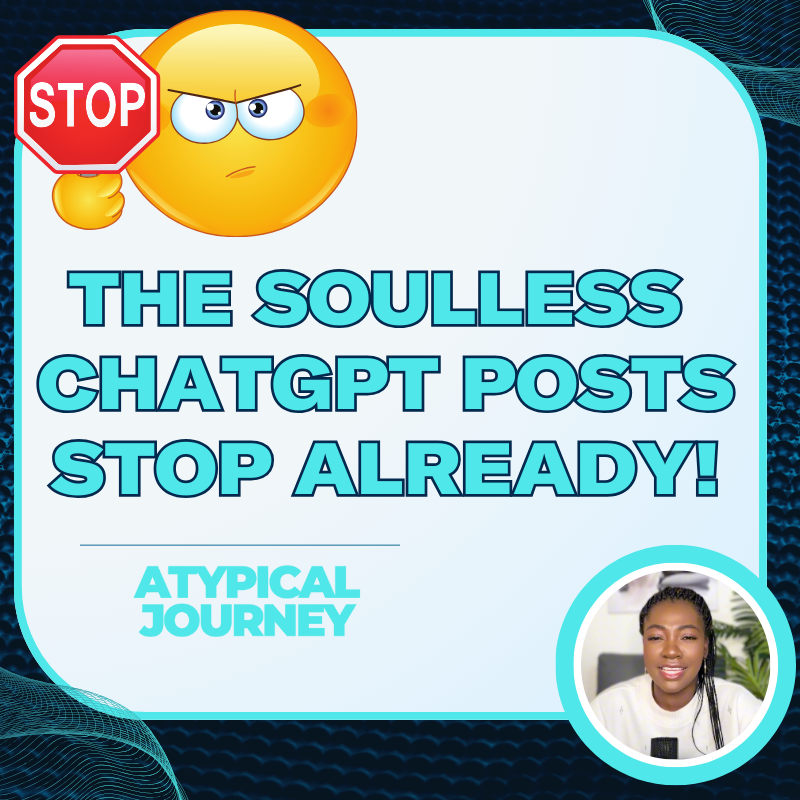The soulless ChatGPT posts: have we gone too far?

“As technology advances, it reverses the characteristics of every situation again and again. The age of automation is going to be the age of ‘do it yourself.’” Marshall McLuhan
I’ve been thinking about this quote I studied back in undergrad. And the more I think of ChatGPT, the more it resonates.
It’s amazing how powerful AI has become. It saves time, enhances creativity, and every day I’m learning new things it can do: interior design, generating content and images, coding, building business strategies, designing logos, writing scripts, creating outlines, drafting contracts… and the list keeps growing.
But if anyone can produce work instantly, if anyone can write posts and sound like an expert on any topic, then what becomes of the value of human work? Of human thought? What becomes of the importance of a job, or the depth that comes with lived experience?
Has generative AI created conformity and slowly killed human value?
Well you see, McLuhan’s quote reflects his broader idea: technological change isn’t linear, it’s dialectical. He believed that every medium or technology, when pushed far enough, eventually reverses its effects. This is part of his concept called “the tetrad of media effects,” where every technology:
• Enhances something,
• Obsoletes something,
• Retrieves something from the past,
• And reverses into its opposite when overextended.
So yes AI is a gift. But it won’t and shouldn’t prevent us from using our brains. For those who are already thoughtful, it does the things that consume time so we can focus on what really matters, what we’re best at.
What I call a soulless ChatGPT post is easy to spot:
- It’s grammatically correct.
- It flows well.
- It has good ideas.
- Polished but robotic.
- No soul. No real voice. Just… bland.
- All the titles sound the same. The sentence structure is the same.
- Sounds like a Wikipedia article with plenty of stock emojis: ✨💼📈🔥🙌📊✅
Don’t get me wrong ChatGPT is a powerful tool. But you have to be smart with it. Joanna Maciejewska said:
“I want AI to do my laundry and dishes so that I can do art and writing, not for AI to do my art and writing so that I can do my laundry and dishes.”
Sounds a bit extreme and unrealistic, but maybe she has a point. We can think about it differently: all of the things that take more time but aren’t central to the originality of your thought or the uniqueness of your perspective or creativity, have ChatGPT do it. Consider those things “the dishes”and now focus on adding the great stuff that makes you a unique voice.
For the love of God, stop giving one vague sentence to ChatGPT and letting it write your whole post.
We can tell can tell it’s a Chat GPT post. It doesn’t bring any value because not only we see the same posts everywhere but we can literally do the same thing you did. Head over to Chat GPT and tell him to “Write a post about X,Y,Z”
Use better prompts. ChatGPT isn’t magic.
Stop being lazy with your prompts. Stop typing lazy stuff like “Write a post about leadership.” One vague sentence will get you a vague post. You want something good? Give context, tone, structure, even examples. Feed it as you would a collaborator, not a vending machine.
Use AI to expand and facilitate your work.
Use it for research, for outlines, to organize your ideas. Use it for things you already care about deeply, have knowledge and perspective on. That way, ChatGPT becomes an addition to the burning fire inside you. That’s how you go from “meh” to “this actually sounds like me.”
Don’t fake what you don’t know.
If you’re clueless about a topic, don’t use AI to bluff your way through. If you want to speak on a subject you’re not familiar with, do your research. Learn the complexities and nuances of the topic. Gain some experience, read the experts, and reflect on it. It’s fine that ChatGPT helped you write it, but it will make a huge difference when the post has a fresh and singular outlook.
Because nothing screams “I copied this” louder than a confident-sounding post that says… nothing new.
And finally: if it doesn’t sound like you, it’s not good.
Copying and pasting the first draft ChatGPT gives you is like serving a frozen meal at a dinner party. The first draft is rarely the best. If the tone, the examples, the vocabulary don’t reflect how you think or express yourself, that’s your sign it’s not ready. Read it out loud. If it feels stiff, generic, or like anyone could’ve written it, rewrite it. Ask it to rephrase. Change the angle. Push back. Good writing is rewriting, even with AI.
Technology is amazing because it allows us to focus on what really matters. But don’t forget: the soul of your work should still come from you.
And by the way, ChatGPT lies a lot. Make sure to always fact-check and don’t embarrass yourself. 😉 If you’re citing studies, quotes, or numbers, verify them. ChatGPT is smart, but it hallucinates confidently.
